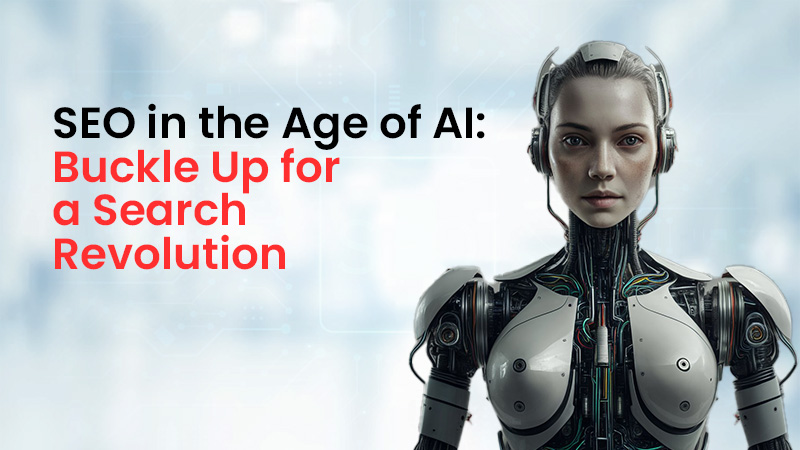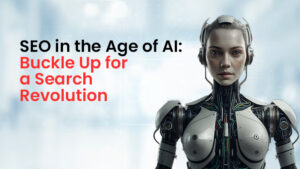The SEO landscape is undergoing a monumental shift. Forget keyword stuffing and chasing backlinks – the days of tricking search engines are over. Artificial intelligence (AI) is rapidly transforming how search works, and business owners and marketing professionals need to adapt or risk getting left behind. Here’s a glimpse into how AI will reshape the future of search optimization:
1. Tate-e-tete with the Search Engine
If you have used Chatgpt or Gemini, it would have been clear to you that you conversationally interact with them. For example, you might write, ‘Suggest some unique gift ideas for my wife on our anniversary. Keeping in mind her personality…..’
Whereas the same thing on Google will go as ‘anniversary gift ideas’ or ‘anniversary gift ideas for wife’
With the advent of AI the search queries will change from being merely a random string of keywords to more like a conversation.
Websites need to have content that is more user-centric and is written in the tonality of their target audience. What becomes more important is the context in which the search query is written and does the website content answers that query in the same context.
2. From Keywords to User Intent: Understanding What People Really Want
Remember those days when cramming your content with keywords like “best running shoes” was the golden rule of SEO? AI-powered search engines like Google’s RankBrain are going down heavily on that strategy. They delve deeper, analyzing the entire search query, including surrounding words and phrasing, to grasp the searcher’s true intent. Searching for “best running shoes for beginners” won’t just bring up pages filled with those keywords. Instead, you’ll see results packed with reviews, comparisons, and buying guides – content that truly caters to the user’s need to find the perfect shoe for starting their running journey. This shift demands a new focus: creating high-quality, informative content that speaks directly to your audience’s needs and questions.
A 2022 study by Search Engine Land found that 64% of SEO experts surveyed believe that focusing on user intent is the most crucial factor for ranking high in search results.
3. Domain authority will be replaced by average engagement time
With AI learning capabilities and a focus on user intent and the context of the query, search engines will understand the user behavior more precisely. Consequently, the traditional ranking factors like domain authority will be replaced by a matrix that indicates positive user behavior on the website such as average engagement time or session duration.
Websites need to transform themselves into something that encourages user interaction and keeps them hooked on the website.
4. Searches will Become Multi-modal
Well, you see we are already searching for information through different modes on Google. We do voice search, we search through Google lens and we do text search. However, with AI in the picture, the searches might change in a way that people just upload the image of a dress and ask the search engine to show pair of shoes that matches with that dress. The search engine, with AI capabilities, in return, will give results from World Wide Web and show all the pictures that matches the dress.
It will be important for the website owners to have good quality images and videos and have proper alt tags on them to make them show up in search results.
5. AI-powered Tools: Your SEO Sidekick
Manual keyword research and competitor analysis? Tedious and time-consuming. AI is here to be your hero with a suite of powerful SEO tools:
- Smarter Keyword Research: AI goes beyond search volume, diving into the “why” behind the keywords. Tools like SEMrush and Ahrefs can help you discover long-tail keywords with lower competition but higher purchase intent. For example, instead of just targeting “running shoes,” you might uncover “best cushioned running shoes for flat feet.”
- Content Optimization on Autopilot: Struggling to optimize your content for the latest SEO best practices? AI analyzes your content and offers suggestions, ensuring it aligns with what search engines are looking for. Moz Pro’s on-page grader is a great example, providing insights on factors like keyword density, title tag optimization, and internal linking.
- Unveiling the Competition’s Secrets: Gone are the days of guesswork. AI-powered competitor backlink checkers like Majestic reveal your competitor’s backlinks, giving you valuable insights to build your own winning strategy.
By automating these tasks, AI frees up your time to focus on what matters most: crafting strategic plans and developing creative content that resonates with your audience. Plus, AI can unearth hidden gems in vast data sets, providing insights that would be impossible for humans to uncover alone. For instance, AI can analyze click-through rates (CTR) for different search queries, helping you identify topics with high user interest but low competition.
6. Predicting the Future: SEO That Gets Ahead of the Curve
Imagine knowing what content users will be searching for tomorrow. That’s the magic of predictive SEO. AI can analyze past search queries and user behavior patterns to anticipate future search trends. This allows you to create content that aligns with those upcoming needs, positioning your website for better ranking when those searches become mainstream.
Example: An SEO for a travel website might notice a rise in searches for “sustainable travel tips” in recent months, fueled by growing eco-conscious consumer trends. AI can recommend creating content about eco-friendly destinations or responsible packing practices, ensuring the website is perfectly positioned to capture future traffic when sustainable travel becomes an even bigger search trend.
7. The Human Touch: Creativity Still Reigns Supreme
While AI is a powerful ally, it’s important to remember it’s a tool, not a replacement for human expertise. SEOs will still need critical thinking skills to analyze the data provided by AI tools and make informed decisions. The ability to craft compelling content, understand user psychology, and stay ahead of the latest trends – these are all irreplaceable human strengths that will continue to be crucial for SEO success.
Conclusion
AI is sure to bring lots of changes in the SEO landscape for enhancement of quality and user experience. Also, it will assist SEO professionals and website owners to make their websites more user-friendly. By embracing AI technologies to automate tasks and leveraging human creativity to analyze data, interpret insights, and craft compelling content, SEO professionals can stay ahead of the curve and unlock new opportunities for growth and success in the ever-evolving digital landscape.







